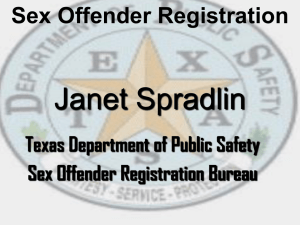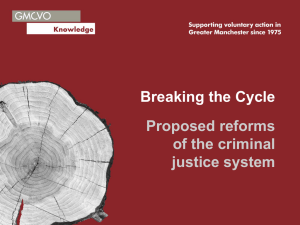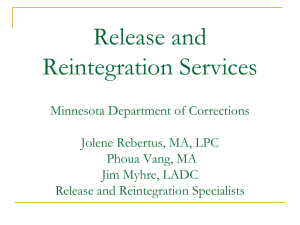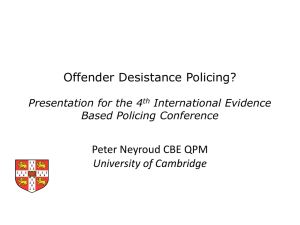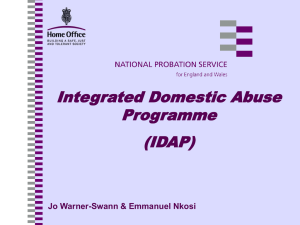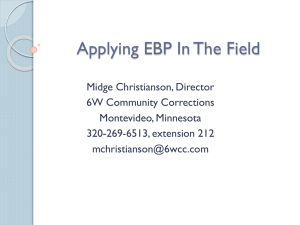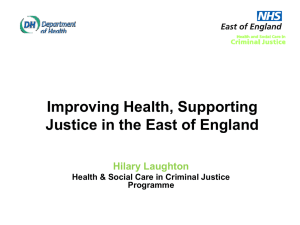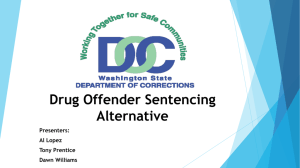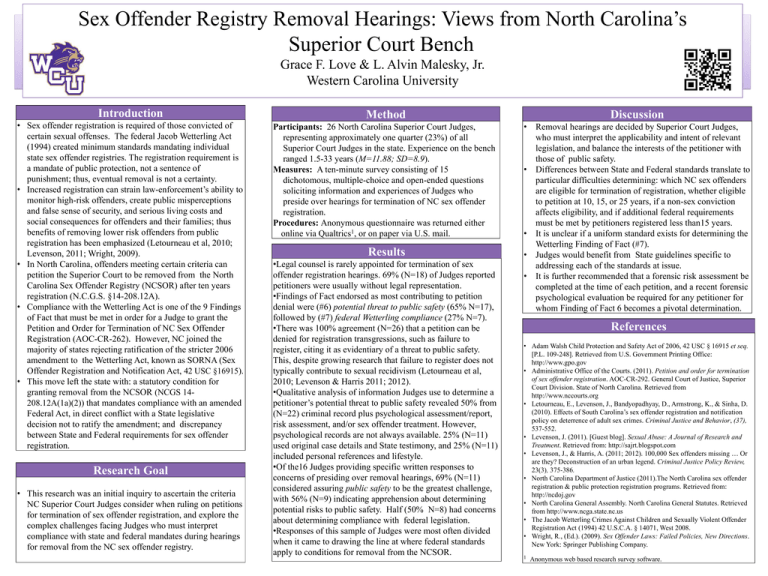
Sex Offender Registry Removal Hearings: Views from North Carolina’s
Superior Court Bench
Grace F. Love & L. Alvin Malesky, Jr.
Western Carolina University
Introduction
• Sex offender registration is required of those convicted of
certain sexual offenses. The federal Jacob Wetterling Act
(1994) created minimum standards mandating individual
state sex offender registries. The registration requirement is
a mandate of public protection, not a sentence of
punishment; thus, eventual removal is not a certainty.
• Increased registration can strain law-enforcement’s ability to
monitor high-risk offenders, create public misperceptions
and false sense of security, and serious living costs and
social consequences for offenders and their families; thus
benefits of removing lower risk offenders from public
registration has been emphasized (Letourneau et al, 2010;
Levenson, 2011; Wright, 2009).
• In North Carolina, offenders meeting certain criteria can
petition the Superior Court to be removed from the North
Carolina Sex Offender Registry (NCSOR) after ten years
registration (N.C.G.S. §14-208.12A).
• Compliance with the Wetterling Act is one of the 9 Findings
of Fact that must be met in order for a Judge to grant the
Petition and Order for Termination of NC Sex Offender
Registration (AOC-CR-262). However, NC joined the
majority of states rejecting ratification of the stricter 2006
amendment to the Wetterling Act, known as SORNA (Sex
Offender Registration and Notification Act, 42 USC §16915).
• This move left the state with: a statutory condition for
granting removal from the NCSOR (NCGS 14208.12A(1a)(2)) that mandates compliance with an amended
Federal Act, in direct conflict with a State legislative
decision not to ratify the amendment; and discrepancy
between State and Federal requirements for sex offender
registration.
Research Goal
• This research was an initial inquiry to ascertain the criteria
NC Superior Court Judges consider when ruling on petitions
for termination of sex offender registration, and explore the
complex challenges facing Judges who must interpret
compliance with state and federal mandates during hearings
for removal from the NC sex offender registry.
Method
Discussion
Participants: 26 North Carolina Superior Court Judges,
representing approximately one quarter (23%) of all
Superior Court Judges in the state. Experience on the bench
ranged 1.5-33 years (M=11.88; SD=8.9).
Measures: A ten-minute survey consisting of 15
dichotomous, multiple-choice and open-ended questions
soliciting information and experiences of Judges who
preside over hearings for termination of NC sex offender
registration.
Procedures: Anonymous questionnaire was returned either
online via Qualtrics1, or on paper via U.S. mail.
•
Results
•
•Legal counsel is rarely appointed for termination of sex
offender registration hearings. 69% (N=18) of Judges reported
petitioners were usually without legal representation.
•Findings of Fact endorsed as most contributing to petition
denial were (#6) potential threat to public safety (65% N=17),
followed by (#7) federal Wetterling compliance (27% N=7).
•There was 100% agreement (N=26) that a petition can be
denied for registration transgressions, such as failure to
register, citing it as evidentiary of a threat to public safety.
This, despite growing research that failure to register does not
typically contribute to sexual recidivism (Letourneau et al,
2010; Levenson & Harris 2011; 2012).
•Qualitative analysis of information Judges use to determine a
petitioner’s potential threat to public safety revealed 50% from
(N=22) criminal record plus psychological assessment/report,
risk assessment, and/or sex offender treatment. However,
psychological records are not always available. 25% (N=11)
used original case details and State testimony, and 25% (N=11)
included personal references and lifestyle.
•Of the16 Judges providing specific written responses to
concerns of presiding over removal hearings, 69% (N=11)
considered assuring public safety to be the greatest challenge,
with 56% (N=9) indicating apprehension about determining
potential risks to public safety. Half (50% N=8) had concerns
about determining compliance with federal legislation.
•Responses of this sample of Judges were most often divided
when it came to drawing the line at where federal standards
apply to conditions for removal from the NCSOR.
•
•
•
Removal hearings are decided by Superior Court Judges,
who must interpret the applicability and intent of relevant
legislation, and balance the interests of the petitioner with
those of public safety.
Differences between State and Federal standards translate to
particular difficulties determining: which NC sex offenders
are eligible for termination of registration, whether eligible
to petition at 10, 15, or 25 years, if a non-sex conviction
affects eligibility, and if additional federal requirements
must be met by petitioners registered less than15 years.
It is unclear if a uniform standard exists for determining the
Wetterling Finding of Fact (#7).
Judges would benefit from State guidelines specific to
addressing each of the standards at issue.
It is further recommended that a forensic risk assessment be
completed at the time of each petition, and a recent forensic
psychological evaluation be required for any petitioner for
whom Finding of Fact 6 becomes a pivotal determination.
References
• Adam Walsh Child Protection and Safety Act of 2006, 42 USC § 16915 et seq.
[P.L. 109-248]. Retrieved from U.S. Government Printing Office:
http://www.gpo.gov
• Administrative Office of the Courts. (2011). Petition and order for termination
of sex offender registration. AOC-CR-292. General Court of Justice, Superior
Court Division. State of North Carolina. Retrieved from
http://www.nccourts.org
• Letourneau, E., Levenson, J., Bandyopadhyay, D., Armstrong, K., & Sinha, D.
(2010). Effects of South Carolina’s sex offender registration and notification
policy on deterrence of adult sex crimes. Criminal Justice and Behavior, (37),
537-552.
• Levenson, J. (2011). [Guest blog]. Sexual Abuse: A Journal of Research and
Treatment. Retrieved from: http://sajrt.blogspot.com
• Levenson, J., & Harris, A. (2011; 2012). 100,000 Sex offenders missing … Or
are they? Deconstruction of an urban legend. Criminal Justice Policy Review,
23(3), 375-386.
• North Carolina Department of Justice (2011).The North Carolina sex offender
registration & public protection registration programs. Retrieved from:
http://ncdoj.gov
• North Carolina General Assembly. North Carolina General Statutes. Retrieved
from http://www.ncga.state.nc.us
• The Jacob Wetterling Crimes Against Children and Sexually Violent Offender
Registration Act (1994) 42 U.S.C.A. § 14071, West 2008.
• Wright, R., (Ed.). (2009). Sex Offender Laws: Failed Policies, New Directions.
New York: Springer Publishing Company.
1
Anonymous web based research survey software.



